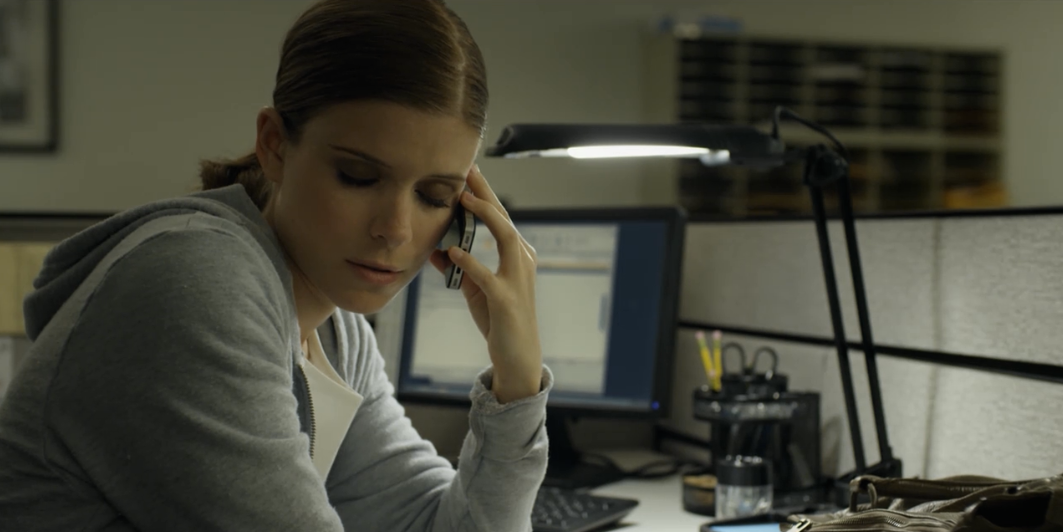 I’ve recently gotten addicted to the Netflix political drama House of Cards, starring Kevin Spacey. Spacey’s character Frank Underwood is a congressman who plays all the political games of bribery and self-interest. It’s not the most ethical or moral storyline, but it is intriguing. Underwood befriends a young journalist named Zoe Barnes who works at a Washington newspaper. Zoe’s getting famous for some juicy political news she’s helped leak courtesy of Underwood. In episode 3 of season 1, when Nightline offers her an on-air job she’s not sure whether to take the job or not so she calls Underwood.
I’ve recently gotten addicted to the Netflix political drama House of Cards, starring Kevin Spacey. Spacey’s character Frank Underwood is a congressman who plays all the political games of bribery and self-interest. It’s not the most ethical or moral storyline, but it is intriguing. Underwood befriends a young journalist named Zoe Barnes who works at a Washington newspaper. Zoe’s getting famous for some juicy political news she’s helped leak courtesy of Underwood. In episode 3 of season 1, when Nightline offers her an on-air job she’s not sure whether to take the job or not so she calls Underwood.
Underwood, despite being a totally unethical and immoral human being, seems to lead Zoe through an Ignatian composition of place, one that Saint Ignatius would be proud of:
Underwood: Close your eyes.
Zoe: Okay.
Underwood: It’s 11:25. Nightline is about to come on. Millions of people are watching. Where are you? Home?
Zoe: No.
Underwood: At the studio?
Zoe: Yes.
Underwood: And what do you see?
Zoe: I see lights. I see a camera.
Underwood: And that little red dot goes on. Tell me what you hear.
Zoe: I hear my voice.
Underwood: And those millions of people? What do they hear?
Zoe: My voice.
Underwood: And what do they see?
Zoe: My face.
Underwood: So you don’t need my advice.
It was as if the writers pulled a page right out of the Spiritual Exercises. Composition of place is all about setting the scene of what’s before us, whether that’s a gospel passage or a choice, like in Zoe’s situation. Ignatius asks us to engage all our senses. What do we see and hear? What do we feel and smell? Our imaginative senses give us important information that God can use to communicate with us, especially in the realm of decision-making.
Zoe is confronted by a difficult choice. She’s at a job that, for her journalistic zeal, seems too restricting. Nightline seems to offer her more promise, certainly for her career. Underwood led her through an imaginative contemplation that Ignatius would say raises up our deep desires, simply by imagining ourselves with one decision (going with Nightline in this case). By imagining ourselves having chosen one decision or the other, we gather information in the discernment process. Imaginative contemplation like this is just one of several methods of Ignatian decision-making.
Of course, I don’t believe Zoe was in a true place of freedom or making her decision truly vocationally or for the glory of God, but this scene from House of Cards offers a snippet of an example of how Ignatian contemplation can be applied practically.
I’m only a handful of episodes into the series so I’ll let you know if anything more Ignatian comes up as I continue watching!
Resources on Ignatian decision-making:
|
Listen to an audio version of this post…
Music by Kevin MacLeod









Reblogged this on Walking With My Brother and commented:
A fine example of finding “God In All Things.” Great post from Andy Otto.
I also started to get addicted to the series; but since I discovered how evil works its way (this is ignatian too), I realizaed that, more than enjoy watching, was getting stressed and down … so I did the opposite (ignatian too): stopped watching. 🙂
By Season Two I found the evil to be so oppressive, I had to stop watching also. Everything inside of me shouted STOP.
I definitely had the exact same thought when I saw that episode. I was like, “wow, how Ignatian!”